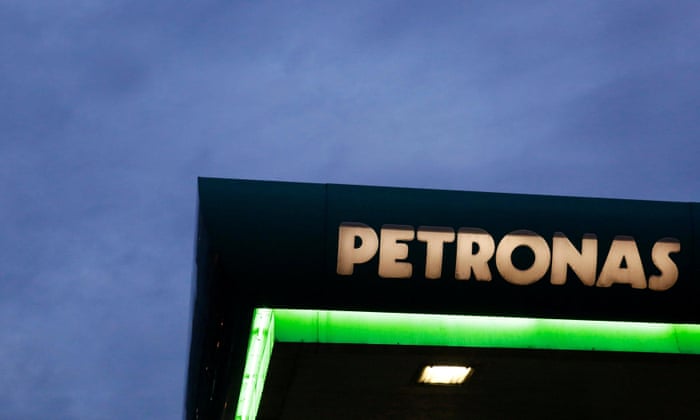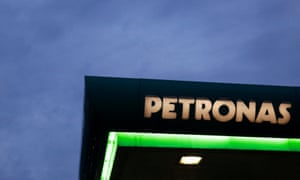A Brief Colonial History Of Ceylon(SriLanka)
Sri Lanka: One Island Two Nations
A Brief Colonial History Of Ceylon(SriLanka)
Sri Lanka: One Island Two Nations
(Full Story)
Search This Blog
Back to 500BC.
==========================
Thiranjala Weerasinghe sj.- One Island Two Nations
?????????????????????????????????????????????????Thursday, September 29, 2016
Environmentalists 'expected better' of Trudeau as Canada backs gas project
 The project is backed by Malaysia’s energy giant Petronas. Photograph: Reuters
The project is backed by Malaysia’s energy giant Petronas. Photograph: Reuters
The
Pacific NorthWest LNG project would ship 19m tons a year of frozen,
liquefied natural gas to markets in Asia – and create jobs, says the
government

Canada’s commitment to fighting climate change has been questioned after the Liberal government, led by Justin Trudeau, announced conditional approval for a C$36bn liquefied natural gas project in northern British Columbia.
The decision – the Trudeau government’s first on a major energy project –
was announced late on Tuesday. “The government approved the Pacific
NorthWest LNG project,” Catherine McKenna, the environment minister,
told reporters in a Vancouver suburb.
Backed by Malaysia’s energy giant Petronas, the project would ship 19m
tonnes a year of frozen, liquefied natural gas to markets in Asia. The
government promised the project, one of Canada’s largest resource
development projects, would create thousands of jobs – as many as 630
direct and spin-off jobs and 4,500 construction jobs – and add nearly
C$2.4bn per year to the country’s GDP.
The government’s approval was contingent on the project meeting 190
conditions, including keeping greenhouse gas emissions capped at 4.3m
tonnes per year, a drop of about 20% from the project’s initial
proposal. Upstream emissions are not included in this cap and could add
as much as 8.7m tonnes of carbon emissions to the project, according to
estimates from a draft report released by the Canadian Environmental
Assessment Agency in February.
McKenna said the decision had been informed by rigorous environmental
assessment as well as meaningful consultations with First Nations
groups. “The only way to get resources to market in the 21st century is
if it is done in a responsible and sustainable manner. This decision
reflects this objective.”
But despite claims by the British Columbia government that the exported
fuel would offer an alternative to coal-fired plants in Asia,
environmentalists warned the approval of the project would undermine
Canada’s climate change commitments.
“How can Prime Minister Trudeau claim to be a climate leader on the
international stage, while approving this new project that will become
the single largest source of climate pollution in the country?” Karen
Mahon of Stand Earth asked in a statement after the decision was
announced. “Honestly we expected better.”
Since taking the reins of Canada’s government last year, Trudeau has sought to position himself as a climate change leader on the world stage while
assuring Canadians that the government would strike a balance between
caring for the environment and bolstering the country’s struggling
energy industry.
The Pacific NorthWest LNG project, which includes a nearly 600-mile
(900km) natural gas pipeline and an LNG facility near Prince Rupert in
British Columbia, was widely seen as one of the government’s first tests
of this commitment.
During last year’s federal election campaign, Trudeau courted
environmentalists with promises to invest millions of dollars in clean
tech and confront climate change.
Tuesday’s approval was a betrayal to the many who voted for action on
climate change, said Caitlyn Vernon of the Sierra Club of British
Columbia. “The Trudeau government’s lofty rhetoric on climate has been
proven nothing more than sunny ways talking points.”
In May, 90 scientists and climate experts from Canada, the US and
Australia urged Trudeau and his government to reject the Pacific
NorthWest LNG project in an open letter.
The 190 conditions set out by the government provided a chance to
meaningfully address some of the concerns, said Merran Smith of Clean
Energy Canada. Instead, the bar was set too low. “What’s shocking about
this approval is that other LNG projects are proposing much cleaner
operations,” she said. “Ottawa should have required Pacific NorthWest to
run on clean electricity and use available technology to reduce its
carbon pollution by more than 40%.”
Even before the government announced its decision, six First Nations affected by the project said the
project had so far failed to meet their expectations for respecting
indigenous rights. “Providing a green light for this project at this
time will only lead to protracted litigation which benefits no one,” the
Skeena Corridor Nations said in a statement.
In the wake of Tuesday’s announcement, analysts pointed out there was
little guarantee that the project would be built. The government’s
decision comes amid weakening demand and oversupply in the global
natural gas market. While those behind the project welcomed the approval
and described it as a significant milestone, the company said a total
review of the project would be carried out by the company and
shareholders before any final decision is taken.
